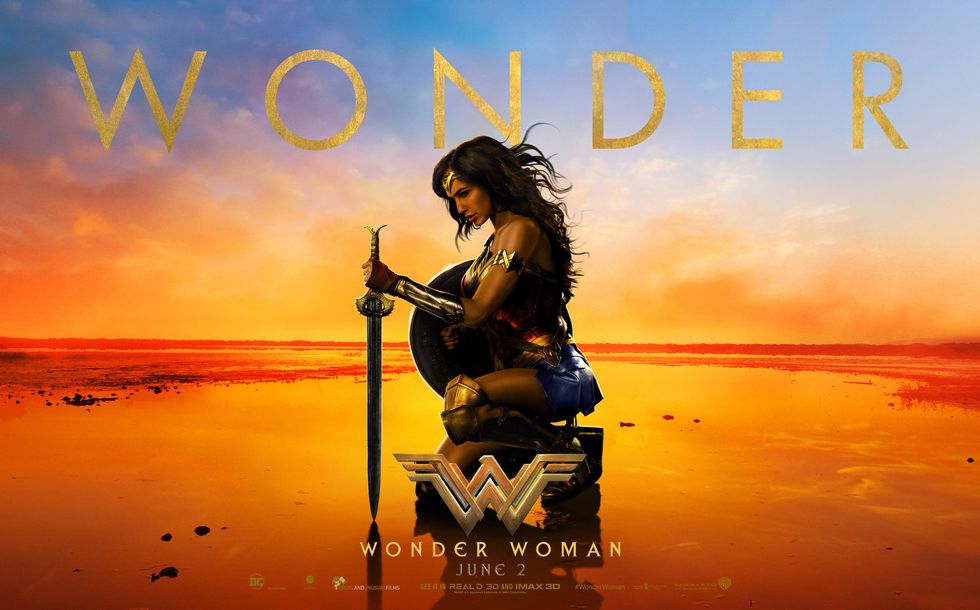I love superhero movies. I love superheroes. And even when girls weren't cool to an eight-year-old boy like myself, Wonder Woman was cool when she fought with the boys in the "Justice League" cartoon. I was stoked when Warner Bros. announced their plans to finally produce a solo Wonder Woman movie.
I was ready to enjoy it, and I did, but only with an ethical bomb looming over me for the duration of the film.
A lot of positive buzz has surrounded "Wonder Woman" upon its release, and with good reason. The movie is the best in the DC Extended Universe to date and has even earned an outstanding achievement for women in film (a much needed victory in sexist Hollywood). It's even given me hope that people might embrace my female lead.
*SPOILERS AHEAD*
The story's views on war evolve with Diana in a natural way. She learns, by witnessing the turmoil of WWI, that "heroes" in war are not determined by which side a soldier might be on, an invaluable lesson that even adults seem to forget, especially Americans. There are no "good guys" and "bad guys" in war. Nothing is as clear cut as that.
This lesson, while great for young people to digest, comes at the price of irony, however.
The star of "Wonder Woman," Gal Gadot, is a former Israeli Defense Forces military trainer, serving her country for two years. Israel, as you most likely already know, has been under harsh criticism for many years for its military presence in Palestine, and with good reason.
As such, the film's release has taken backlash by anti-Israel causes, and was even banned from being shown in Lebanon, due to the conflict between Israel and Lebanon a little over a decade ago.
The conflict between Israel and Palestine goes deep and has a complicated history (though this infographic does a decent job of breaking it down into layman's terms). Many believe Israel's treatment of the Arab population in Palestine to be unlawful and immoral, a cause which, unfortunately, has been openly supported by our new symbol of feminist justice in film. Though her nationalist post is from 2014, and though Hamas is no symbol of justice either, Gal Gadot shows clear support for an army that has committed unjustifiable acts of violence to Arabs. (And it has been difficult to get an updated stance from her regarding the IDF, if there is one).
... so then... where do we go from here? What are we left with?
I say, irony.
It is ironic for a superhero who claims to see war as objectively terrible be played by a woman who has clearly chosen a side, one that has viciously murdered and tortured people based on their ethnicity. (It is worth mentioning that her grandfather was a Holocaust survivor).
So is it a good or bad irony, then?
If it is a bad irony, then what we are left with is a bit of hypocrisy. We have a story that criticizes war but a studio that casts someone who was directly involved in it, on a side that most people agree is unnaturally vicious.
So how could it be a "good irony?" Gal Gadot has not recently come out about her stance, so is it possible things have changed? Not likely, but possible. Even if it has not, what Allan Heinberg and the other writers of "Wonder Woman" have done is forced an actress with a clear military stance to see that there are no "good guys." Not only does Gal Gadot have to swallow this lesson, but so does Israel, since her presence there was influential, to say the least. It might be that "Wonder Woman" is more meta than we ever could have imagined, whether it intended to be or not.
Gal Gadot, to be clear, is no innocent victim, but she is the product of nationalism, a disease that plagues most people around the world in their respective countries. She was raised in Israel, so it is easy to see why she is Zionist.
I cannot support her casting. I cannot support Israel. But what I can get behind are the ideas that this film is planting into the minds of Americans, young and old, that as long as we fight, we are not innocent.
I guess that, at the end of the day, whether we deem the irony of "Wonder Woman" to be good or bad is determinant on how impactful we believe the film's message to be. Can we choose to praise the latest incarnation of Diana Prince without praising its actor?
















